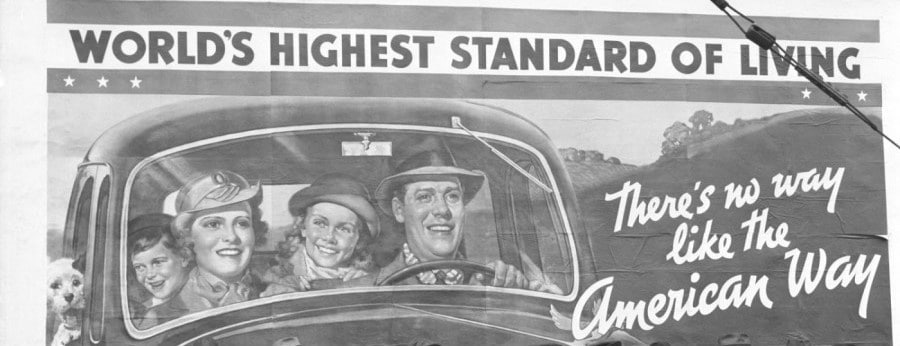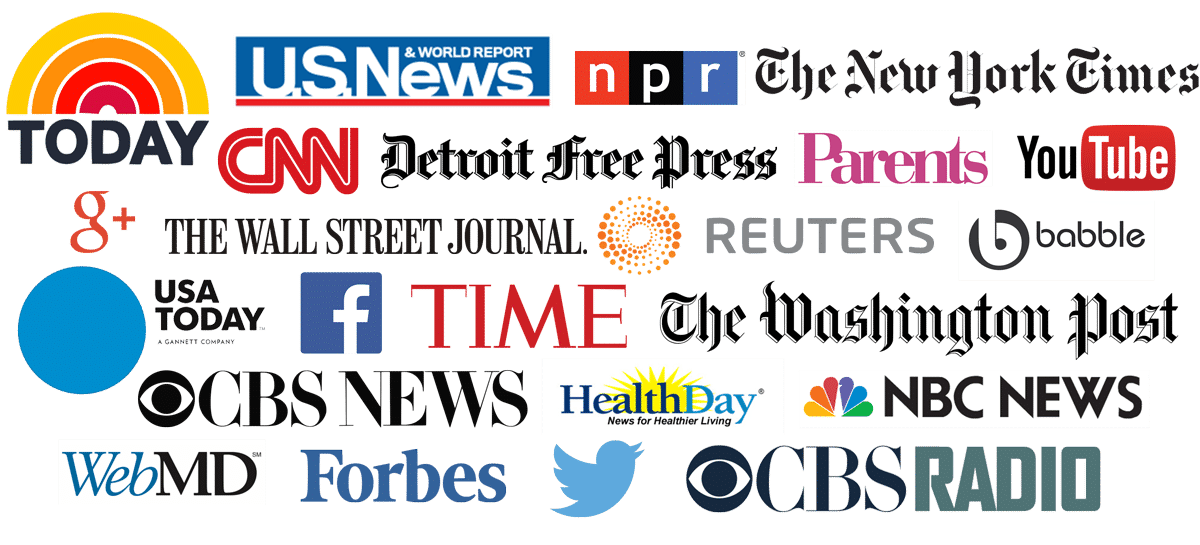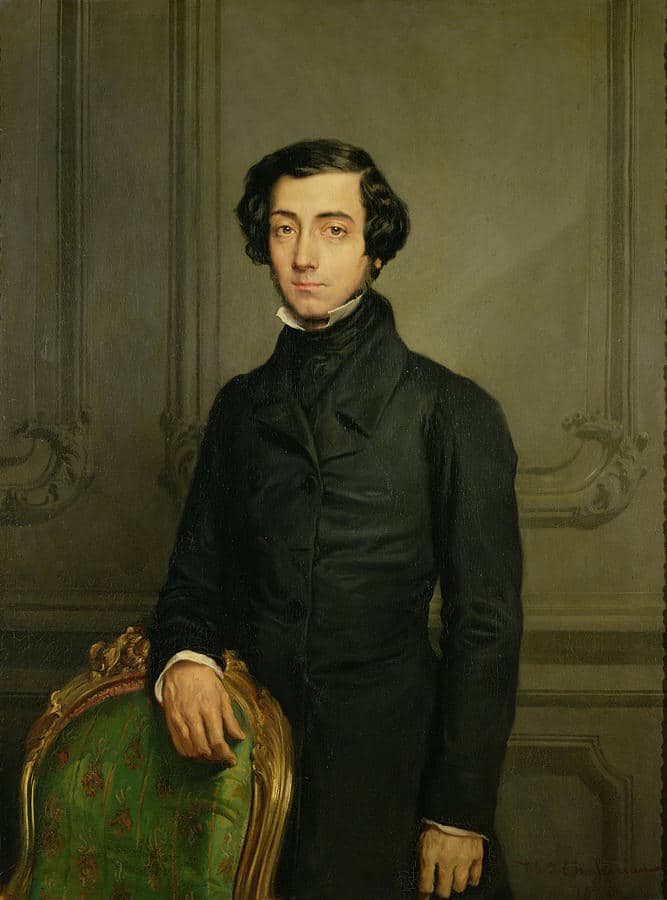Oh America, Where Art Thou?
After the Second World War, our admiration for America was at its height: progress and enlightened ideas set the tone for the entire western world. But the Low Countries’ love of the Land of the Free has gradually been coloured by sorrow and frustration. Or at least, this appears to be the case, based on the many books that have been published in the run-up to the presidential election in November 2020. America-specialist Theo D’haen explains why our affection for the United States has cooled.
Bjӧrn, Monika, Rudi and Steven are sad, indignant, even angry. America has betrayed them. Yet, they still hanker for it like never before. I remember feeling those feelings, those frustrations. They belong to the generation born in the years 1940-1960 – the baby-boomers. For them, the siren song of the Statue of Liberty was loud and clear. What has happened to destroy the admiration the Flemish and Dutch of the post-war era had for the United States and twist it into the despair and even horror described in The Length of an Ocean: Voices and Moods in America (De lengte van een ocean: stemmen en stemmingen in Amerika) by Björn Soenens (VRT – American correspondent); in Americans: It Could Have Been So Great (Amerikanen: Het had zo mooi kunnen zijn) by Steven De Foer (Journalist, De Standaard); in The Torn-Apart States of America (De Verscheurde Staten van Amerika) by Rudi Rotthier (journalist and travel writer); and in The Other America: In the Shadow of Trump (Het andere Amerika: in de schaduw van Trump) by Monika Triest (Emeritus professor of Women’s Studies)?
 Some books, written by Flemish authors, that have been published in the run-up to the presidential election in November 2020
Some books, written by Flemish authors, that have been published in the run-up to the presidential election in November 2020Is it Trump? Or is Trump a “sort of Frankenstein’s monster, created out of the worse parts available from a graveyard with a bad reputation,” as De Foer calls him; just a symptom of everything that has gone wrong in America lately? It is no accident that these four books – incidentally, only a small part of the cartload of books on the same theme – have appeared in the run-up to a presidential election that, without exaggeration, can be described as determining the fate of the United States, and perhaps the entire world.
Happy Days in the 1950s
America was so progressive and beautiful in the post-war years. We can see that in The Voice of America (De Stem uit Amerika) the weekly radio programme featuring Dr. Jan-Albert Goris, better known as the writer Marnix Gijsen; in the popular History of North America (Geschiedenis van Noord-Amerika) by Jaap ter Haar and in scholarly works such as Example in the Distance (Voorbeeld in de verte) by J.W. Schulte Nordholt. The United States was the uncontested leader of the “free West” politically and militarily, but also economically and culturally. Popular television programmes such as Father Knows Best, Margie, Dennis the Menace, Lassie and The Dick van Dyke Show
illustrated a world that was white, suburban, middle class and firmly anchored in WASP (white, Anglo Saxon Protestant) family values.

In that America everything was more modern, more efficient, better, shinier than in Europe. I visited the United States for the first time in 1972. In New York I stayed for a few days in the heart of Manhattan. It was the end of August, stiflingly hot. I barely dared to go out on the streets: too big, too busy, too loud. Everything I had read about, and more – overwhelming! This was the future. Every house boasted a refrigerator, a dishwasher, a washing machine and dryer and a collection of household gadgets that most people in Europe had never even heard of. And in the driveway of every house one or more cars and a basketball hoop. When Trump said he wanted to make American great again he was hearkening back to the Reagan era. Reagan himself wanted to return to the America of Eisenhower and the 1950s. Happy Days! American Graffiti! And to the superficial and flattering image that we in Western Europe had of America until the 1970s. Since then, that image has been gradually, but significantly, tarnished. And it is the new, negative image that pervades the books by Soenens, De Foer, Rotthier and Triest.
The dwindling middle class
The globalisation initiated by Reagan with his Reaganomics, deregulation and unimpeded free trade destroyed hundreds of thousands of jobs in the industrial heartland of America. It caused the demise of Detroit and the emergence of the Midwestern “rust belt,” the very region from which Reagan hailed. Sustained periods of disinvestment in public goods led to the progressive deterioration of the nation’s infrastructure, poor and expensive education, a shameless right-leaning media, faltering Democratic institutions and, under Trump, a revival of the simmering racial inequalities we thought had been laid to rest under Obama. It was an invitation to downright criminal malpractice. Both De Foer and Soenens use the example of Flint, Michigan where, in 2014, the public water supply was connected by order of the governor, to a nearby, heavily polluted river. Very soon, all sorts of health problems appeared. And it’s no coincidence that Flint is a substantially black city. The governor of Michigan at that time was white and Republican.
 The purchasing power of the average American has fallen sharply since 1970.
The purchasing power of the average American has fallen sharply since 1970.© freepix
The earlier image that we had of America was perhaps too one-sided, but when it came to the white middle class, it was largely true. Since then, the much-vaunted American Dream has been shattered for that segment of the population. The purchasing power of the average American has fallen sharply since 1970. Before Reagan it was possible for a middle-class family – and in the United States, almost everyone considered themselves as such – to survive on one salary, usually that of the husband. Owning your own home, having one or two cars, and paying for two children to study at the (generally very good to excellent) state university were considered normal. Now, such a lifestyle is almost unimaginable.
Unequal education opportunities
Now, the norm for a family includes two wage-earners. Owning a home, especially in cities such as New York or San Francisco, is a pipe dream. A university education is almost out of reach financially. For many, it means borrowing tens of thousands of dollars for tuition, books and on-campus housing. It is not unusual to see people aged 40 or 50 still paying off student loans. Above all, the system is flagrantly unfair from the outset. You cannot, as you can in Belgium (or largely also in the Netherlands), simply choose a university. There is a selection process. The worse your grades were in secondary school, the less chance there is of being accepted. The poorer the neighbourhood where you grew up – which generally means that it was ethnic – the poorer the quality of your school and early education.
It is not unusual to see Americans aged 40 or 50 still paying off student loans.
Elementary and secondary schools in the United States are not subsidised by a central governing body. Local taxes determine funding. A poor neighbourhood means less tax revenue, which means worse buildings, fewer or outdated materials, and too few, underpaid, teachers – if they can even be found. There go your chances at a good quality education. There go your chances at a good job. That’s the stranglehold many young Americans find themselves in. Of course, there are also some of the best universities in the world in the United States, such as Harvard, Princeton and Stanford – all excruciatingly expensive private universities where you can only get in if your parents have plenty of money and likely already were alumni. In all honesty, we have to admit there are exceptions: if you are super-intelligent, you have a chance at a top university even if you are poor. Good for you. At the same time this makes for a connection, a bonding, of the rich and the intelligent – and that is how the system perpetuates itself.
Lamentable healthcare
When I travelled through Tennessee in 1972, I often saw bitter poverty, far from the East and West coasts and the big cities. Above all, the United States lacks any sort of social safety net, and also the associated health insurance and pension provisions that come with it. This means that employees are dependent upon their employers. If the company goes belly-up, or you get laid off, you lose all your security. Unemployment benefits are strictly time-limited, low and often non-existent if you fall into the category of an able-bodied person. Additionally, insurance and health costs are set on a sliding scale driven by the insurance companies’, hospitals’ and medical specialists’ pursuit of profit – de-regularization, remember? Many Americans are therefore uninsured and cannot afford proper medical care. Obama tried to remedy the problem by introducing the beginnings of a national, general health insurance – which, incidentally, still excludes millions of Americans.
 Many Americans are uninsured and cannot afford proper medical care.
Many Americans are uninsured and cannot afford proper medical care.© Tides.org
In 2016, Trump spearheaded a campaign to abolish Obamacare. Fortunately, he was restrained by some of his own party members. And on the subject of pursuing profits: millions of Americans are addicted to opioids – painkillers of all kinds – due to the inordinately permissive prescription practices promoted by the largest pharmaceutical companies. The demise of industry and manufacturing in the previously prosperous steel and mining regions, and the resultant sky-high unemployment, drive the addictions. The same thing goes for the widespread, dire poverty affecting the black populations of the impoverished inner cities. Rudi Rotthier explores this aspect fully in his book The Torn-Apart States of America (De Verscheurde Staten van Amerika).
Politicised media
Björn Soenens and Steven De Foer rightly grumble about the American media – The Fourth and Fifth Estates (the classic mass media and the alternative, non-mainstream and social media). Americans are ill-informed. In many places, away from the coasts and major cities, they only have access to local newspapers. Quality papers like The New York Times, Washington Post, San Francisco Chronicle or Boston Globe are only available in a limited capacity. As a result, most Americans have an extremely limited view of the world. In 1976, a farmer whose land adjoined the Oklahoma campground where we had pitched our tent asked what our plans were after our studies. We’ll go back to Europe, back home, we told him. His immediate reaction was: “Oh, you poor things!” Americans from the heart of the country are 100% convinced that America is the best and only truly civilised country in the world!
 Since the start of Fox News in the 1990s, the media landscape has become increasingly politicised.
Since the start of Fox News in the 1990s, the media landscape has become increasingly politicised.Hardly anyone watches the national news channels – NBC, ABC, CBS – anymore. Cable news channels focus on sensational local stories, and on endless talk shows where the discussion revolves around what some politician or celebrity has said or done – with little concern for anything factual. Since the start of Fox News in the 1990s, the media landscape has become increasingly politicised. The more conservative media – which would be considered radically right in European eyes – play on patriotism, but also on the religious fanaticism of “Middle America.”
It is this section of the American population that feels alienated by the ongoing demographic evolution – by 2050 people of colour will make up more than 50% of the American population, the decline of the traditional economic sectors which mainly affects blue-collar workers, and the erosion of purchasing power. Their fear, anger and despair are at the root of Trump’s success.
Weapons for Trump
In the United States, it is impossible to avoid the topic of religion. Trump won a lot of votes because of his pro-life standpoint, despite his anything but sinless lifestyle and the fact that, not so long ago, he considered himself pro-choice. Away from the coasts and outside of the big cities, radio is often dominated by country music interspersed with hysterical televangelists. To ensure your soul’s salvation you must quickly deposit money in the preacher’s bank account, or at least in his church’s account. The same sort of call, by the way, sounds from the opposite side of the American media landscape. PBS, the Public Broadcasting System, can only survive thanks to the voluntary donations of its (usually elite) listeners.
 The right to “keep and bear arms” is enshrined in the US Constitution.
The right to “keep and bear arms” is enshrined in the US Constitution.© NRA
What likewise gained Trump many votes is his unnuanced support for unrestricted gun ownership. This secures him the support of the powerful weapons lobby. Every time there is yet another mass shooting, the gun lobby rallies with the cry that “if we outlaw guns, then only outlaws will have them.” And the right to “keep and bear arms” is enshrined in the US Constitution, right? Yes, but the fact that this document was written 230 years ago, and in conditions completely different from those of today, is airily brushed aside. The weapons lobby not only offers verbal support to Trump. It also directly or indirectly contributes millions of dollars to his election campaign war chest. Other campaign contributors are far-right multi-millionaires like the Koch brothers. It is, of course, also fair to say that other multi-millionaires – especially from Silicon Valley and the digital economy – do the same for Trump’s opponent(s).
Critical America-watchers
The focus on money touches on a sore point about which earlier European America watchers already had their reservations. The French aristocrat Alexis de Tocqueville travelled throughout the United States in the early 1830s. In his classic work Democracy in America, still an absolute must for anyone studying the country, he expressed his admiration for the egalitarian nature of the fledgling American democracy. But, he warned, when all other distinctions are laid aside, money is the only one left – Trumplandia avant la lettre!
The Dutch historian Johan Huizinga, just after his return from the United States in the 1920s, observed, “We have something you do not; we admire your strength, but we don’t envy you. Your apparatus of civilization and progress, your ‘big cities’ and perfect organisation, only make us long for what is old and quiet and, sometimes, your life hardly seems worth living to us, not to mention your future.”
 The French aristocrat Alexis de Tocqueville (1805-1859) expressed his amazement at the egalitarian nature of the fledgling American democracy.
The French aristocrat Alexis de Tocqueville (1805-1859) expressed his amazement at the egalitarian nature of the fledgling American democracy.© Wikipedia
Almost a hundred years later, another Dutch traveller through America came to a similar conclusion. In 2010 Geert Mak toured the USA in the footsteps of John Steinbeck fifty years earlier. Steinbeck described his journey in Travels with Charley, published in 1962. Charley, by the way, was Steinbeck’s dog. Mak in 2012 published Travels without John (Reizen zonder John). Steinbeck, and thus also Mak, toured practically every region of the United States. Steinbeck had set out to find himself and his country. He was disappointed in both. He had grown old and the United States had failed to live up to its lofty ideals. Mak finds that things have gotten even a lot worse since Steinbeck’s trip – and also that everything that Soenens, De Foer, Rotthier and Triest complain about was already happening under Obama. It’s just that Trump more brutally forces us to face the truth. Arnon Grunberg arrived at a similar conclusion during his trip from New York to Miami in the Spring of 2020. He wrapped up his series of reports wondering how much denial the United States could still handle. For Triest, things are so bad under Trump that it leads her to put her hopes in a backlash in the tradition of progressive America.
 Trump's isolationist America First attitude and his disdain for NATO mean that the United States cannot immediately count on much understanding from Europe.
Trump's isolationist America First attitude and his disdain for NATO mean that the United States cannot immediately count on much understanding from Europe.© Wikipedia
One thing that certainly does not help the image that Europeans these days have of America is the changed geopolitical situation of the United States. In 1950, the country was good for 50 percent of the total global industrial production, and Americans made up just 7 percent of the world’s population. Since then, the figures have dropped, respectively, to less than 20 and 5 percent. This evolution will only continue in the coming decades. Furthermore, Trump’s isolationist America First attitude and his disdain for NATO make that the United States cannot reckon on much understanding from Europe. In other words, America is no longer the only sun on the European horizon.
Don’t stare blindly into the sun
Let’s close on a slightly lighter note, or in any case, on a fictional one. In his novel Grand Hotel Europa (2018) Dutch author Ilja Leonard Pfeijffer portrays, among other things, an American family from Michigan that, like the first-person character in the novel – Ilja – is staying in the stylish, but somewhat dated Italian hotel from the title of the book. The underage daughter of the family seduces Ilja in an extremely professional and skilled manner – not entirely to his displeasure. However, she admonishes him, he must cherish no illusions and above all he must not fall in love. She only seduced him to relieve his tired, European head for just one moment of its thoughts and worries, nothing more. Memphis, as she is called, is a walking cliché – Lolita and Daisy Miller rolled into one. Ilja is staying in the hotel because things are not going well with his Italian girlfriend, whom he desperately longs for. She, Clio, is an Art Historian. She is having no luck finding a reasonably paid job in Italy and will ultimately decide to move – with Ilja – to Abu Dhabi, where she will earn a hefty salary as a curator in a new museum.
While all this is going on, the Grand Hotel Europa is taken over by a new owner. He is Chinese, and he begins to immediately change the hotel to represent the cliché that Chinese tourists have of Europe. Genoa, Venice, Italy, Europe: the Bokrijk of the world.
Let us not fixate too much on the image we hold of America
America’s light is sinking on the western horizon, but the question is whether the sun from the East will bring any more warmth and light. Let us not fixate too much on the image we hold of America. At least as important is the image we hold of ourselves, of Europe. And this more than ever in the year 2020, with corona, Xi Jinping and, oh, yes, Trump, of course – or maybe not? Come November…












